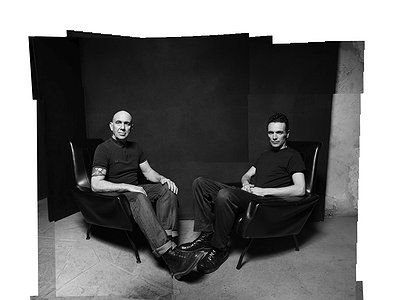Name: thighpaulsandra
Nationality: Welsh
Occupation: Composer, producer, multi-instrumentalist
Current release: thighpaulsandra teams up with Massimo Pupillo for their first album as Uruk, The Great Central Sun, out as part of the Mind Travel Series on Ici d’ailleurs.
[Read our Massimo Pupillo interview]
If you enjoyed this thighpaulsandra interview and would like to stay up to date with his music, visit his official homepage. He is also on Facebook, and bandcamp.
Where does the impulse to create something come from for you? What role do often-quoted sources of inspiration like dreams, other forms of art, personal relationships, politics etc play?
I generally find creating something quite easy. I always have lots of ideas. I have to do a lot of driving for my work and often inspiration strikes on the road so I sing ideas into my phone.
Every few months a start a process of reviewing those ideas and some of them are discarded and others become the inspiration or the skeletons of new pieces. Similarly, as my lyrics are largely constructed from cut-ups I write - lines I hear in conversations or maybe from news - into a book, then sift through them when I need to construct a song or if I’m in need a line to inspire further writing.
I'm not a person who is inspired by dreams, but I do have cultural and societal interests that act as inspiration.
For you to get started, do there need to be concrete ideas – or what some have called a 'visualisation' of the finished work? What does the balance between planning and chance look like for you?
I don’t need concrete ideas to get started.
I love chance, but choices have consequences and once an initial foundation stone has been laid I find it exciting to explore the paths leading from this, some of which might not initially be obvious.
Is there a preparation phase for your process? Do you require your tools to be laid out in a particular way, for example, do you need to do 'research' or create 'early versions’?
As long as I’m not hungry or tired I can work.
I never create demos of my work. I like to get on with creating the real thing. Editing can be a brutal process though.
Do you have certain rituals to get you into the right mindset for creating? What role do certain foods or stimulants like coffee, lighting, scents, exercise or reading poetry play?
Breakfast, coffee, work. Lunch, afternoon walk, tea, more work. Dinner, still more work.
What do you start with? How difficult is that first line of text, the first note?
I try not to think too much. Just play and make sure we’re recording.
To quote a question by the great Bruce Duffie: When you come up with a musical idea, have you created the idea or have you discovered the idea?
I’ve definitely created it.
Once you've started, how does the work gradually emerge?
It’s generally fairly obvious to me where things should go next. Sometimes that involves a gradual transition and sometimes a shock is required.
Many writers have claimed that as soon as they enter into the process, certain aspects of the narrative are out of their hands. Do you like to keep strict control or is there a sense of following things where they lead you?
Hands are wonderful things. One minute capable of the most delicate touch, the next, strangling one’s creation.
Control is everything.
Often, while writing, new ideas and alternative roads will open themselves up, pulling and pushing the creator in a different direction. Does this happen to you, too, and how do you deal with it? What do you do with these ideas?
I usually follow every interesting path. In the editing process some of the ideas are excised and are either banked for later use or immediately turned into new pieces.
There are many descriptions of the creative state. How would you describe it for you personally? Is there an element of spirituality to what you do?
Absolutely none. I am not remotely spiritual.
Once a piece is finished, how important is it for you to let it lie and evaluate it later on? How much improvement and refinement do you personally allow until you're satisfied with a piece? What does this process look like in practise?
Once a piece is finished I like to work on something else immediately, almost as a palette cleanser. That’s the only way I can remain objective.
Listening in different environments and with different people changes my perception of the thing I’ve created and this for me is an important part of the editing process.
What's your take on the role and importance of production, including mixing and mastering for you personally? How involved do you get in this?
It’s exceptionally important. As important as the notes.
I have worked as a recording engineer and producer for over 30 years so it has inevitably become part of my writing process.
I leave mastering to people I trust as I think they do a far better job than I ever could.
After finishing a piece or album and releasing something into the world, there can be a sense of emptiness. Can you relate to this – and how do you return to the state of creativity after experiencing it?
That never happens to me. I’m always looking forward to the next creative opportunity.
Creativity can reach many different corners of our lives. Do you personally feel as though writing a piece of music is inherently different from something like making a great cup of coffee? What do you express through music that you couldn't or wouldn't in more 'mundane' tasks?
I love cooking but I’m no chef.
I have made some music that other people seem to like and I’d like to think that by its existence I have changed people’s lives. Hopefully, even briefly, for the better.




